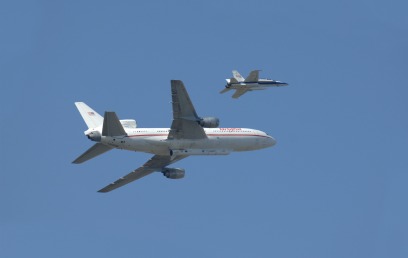DARPA and Boeing to Dream Up New Airborne Launcher
Wanted: an airborne system than can launch 100-pound satellites for under $1 million.

Orbital Science's airborne launch system, the Lockheed L-1101 "Stargazer" with a Pegasus rocket strapped underneath. Photo courtesy Orbital Science Corps.
Making it easier, cheaper, and quicker to get things into orbit is the hot ticket right now. In our latest issue we cover the ongoing efforts by the Operationally Responsive Space office, working out of Kirtland Air Base in New Mexico, to make quick-launch spacecraft. DARPA’s also in that game: last week they awarded Boeing a $4.5 million contract to study airborne satellite launch systems. DARPA’s website explains:
The goal of ALASA is to develop a significantly less expensive approach for routinely launching small satellites, with a goal of at least threefold reduction in costs compared to current military and US commercial launch costs. Currently, small satellite payloads cost more than $30,000 per pound to launch, and must share a launcher with other satellites. ALASA seeks to launch satellites on the order of 100 pounds for less than $1M total, including range support costs, to orbits that are selected specifically for each 100 pound payload.
They also note other disadvantages of fixed launch sites, like weather delays and limitations on the types of orbits available. Of course, the idea for aircraft-based launches goes back to NASA’s X-planes in the 1950s. Today, Orbital Sciences Corp. sends satellites into space with its Pegasus rocket that launches from a Lockheed-1101 Tri-Star (NASA’s NuSTAR spacecraft is scheduled for a June 13 airborne launch). And Stratolaunch Systems, the collaboration of Scaled Composites, SpaceX, and Dynetics, is in the works to take payloads up “affordably and responsibly” (and if successful, “mark the dawn of a new era of space transportation,” if they do say so themselves).
With ALASA, which has been in the works since November 2011, DARPA is looking for something a bit lighter-duty for smaller satellites — the Pegasus/Tri-Star can carry up to 1,000 pounds, while the Stratolaunch will likely be rated for payloads upwards of 100,000 pounds. And somehow, they want this launch system designed so that it requires “no recurring maintenance or support, and no specific integration to prepare for launch.” A pick-it-up-and-go system, indeed. We’ll be interested to see what Boeing comes up with by the end of their 18-month contract.